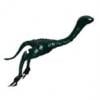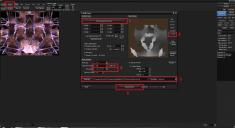Exporting meshes from Mandelbulb 3D v 1.91 to DAZ Studio
 3DPM
Posts: 14
3DPM
Posts: 14
Some people asked me if it´s possible to export meshes from Mandelbulb 3d into DAZ. A little tutorial:
First of all, you have to update to 1.91 version. This can export meshes in obj format
I attach a capture showing where are the important options to export:
Once you have a fractal parameters charged in program:
1.- To open Bulb Tracer, where you can export the mesh.
2.- Import parameters into Bulb Tracer.
3.- Where you can choose the quality of this mesh to export.
4.- Resolution and oversampling. TAKE CARE OF THIS, it can generate so big meshes.
5.- Choose where you want the file exported
6.- Export ... and pray to your god, whatever it be.
If somebody wants to question something ...


Mandelbulb export.jpg
1920 x 1048 - 431K
Post edited by 3DPM on


Comments
Oh, it seems to be not interesting for anybody...
I use Manderlbulber3D and do either stl or slices I make into obj using Fiji imagej
the stl have vertex colours that show in Zbrush but UV mapping them a challenge, I usually have to make a Unified Skin, Zremesh and UV map that then Zproject from the original
video of fractal brocolli with FLUIDOS cheese sauce
Hi WendyLuvsCatz
Your brocoli with cheese sauce looks great!!
Thanks for comment.
Mandelbulber 3D gives you some modeling options that you would not find in any other 3d program.
Happy somebody uses it with DAZ3D.
I mostly use it as is with it's GPU renderer, exporting is a massive undertaking,
also Octane render I can at least apply XYZ to UVW to an unUV mapped obj and there is a free DAZ studio tier if that interests you
https://www.daz3d.com/forums/discussion/368721/octanerender-2019-for-daz-studio-new-free-tier/p1
is a thread here
Wow, thanks for the info.
I think that it may be that most folks using DAZ Studio are not necessarily well-versed in fractal concepts and therefore have no idea what they really are or how they might be used. Certainly there are many wonderful and exotic shapes created using fractal generators that might have many uses in fantasy or scifi scenes, but, as Wendy alludes to, converting them from something that is by its very nature infinite, into something that is by necessity finite, is easier said than done. I think that a fundamental understanding of what fractals are is essential to understanding how to practically do conversions. Therein lies the rub, I believe. And, as Wendy as also pointed out, there remains the problem of UV mapping and recreating surfaces. I have seen many stunning fractal images than do not simply represent fantastically beautiful shapes, but also use equally beautiful colours. If one converts the shapes (or, more correctly, part of those shapes) to a 3D mesh format, but loses the wonderfully beautiful colours, then attempting to recreate those colours in a 3D program, as opposed to merely applying some sort of surface, would seem to remain a formidable challenge. Please correct me if I am wrong.
I fully understand what you say.
Obviously the textures of the 3d fractals are mathematical formulas, the same program generates both the volume and the texture itself using those formulas. Today with the information that I have, it is not possible to export both files. In the 3d fractals that are seen on the web there are generated including lights and shadows.
The question is what we can do with the meshes that can be exported, not with what we cannot export, and there the only thing that can be done is to experiment. the results that can be obtained with imagination are not negligible.
I don't know if it is possible to do a UV Unwrap with those meshes, but I understand that it will be an endless job.
I upload a couple of jobs that include these exported meshes so you understand what i mean:
I haven't tried importing a Mandlebulb 3 mesh yet (working on it) but I have done it with one I made in Incendia Next. The coral-like object in this image is a fractal mesh I imported into Daz and the coloring is from an iray shader.
some eerily beautiful renders there
Ok, next experimental: Incendia Next to try...
Thanx Zatetic.
I remember way back in 1996 I think it was or somewhere arounnd that time when fractals algorithms were 1st used to compress images to make huge images absolutely tiny. I'm not sure if any of those were eventually integrated into mainstream public algorithms though.
I don't remember the name of the company but I bought that program & Future Splash Flash the same day.
Here is a summary of fractal compression:
https://en.wikipedia.org/wiki/Fractal_compression